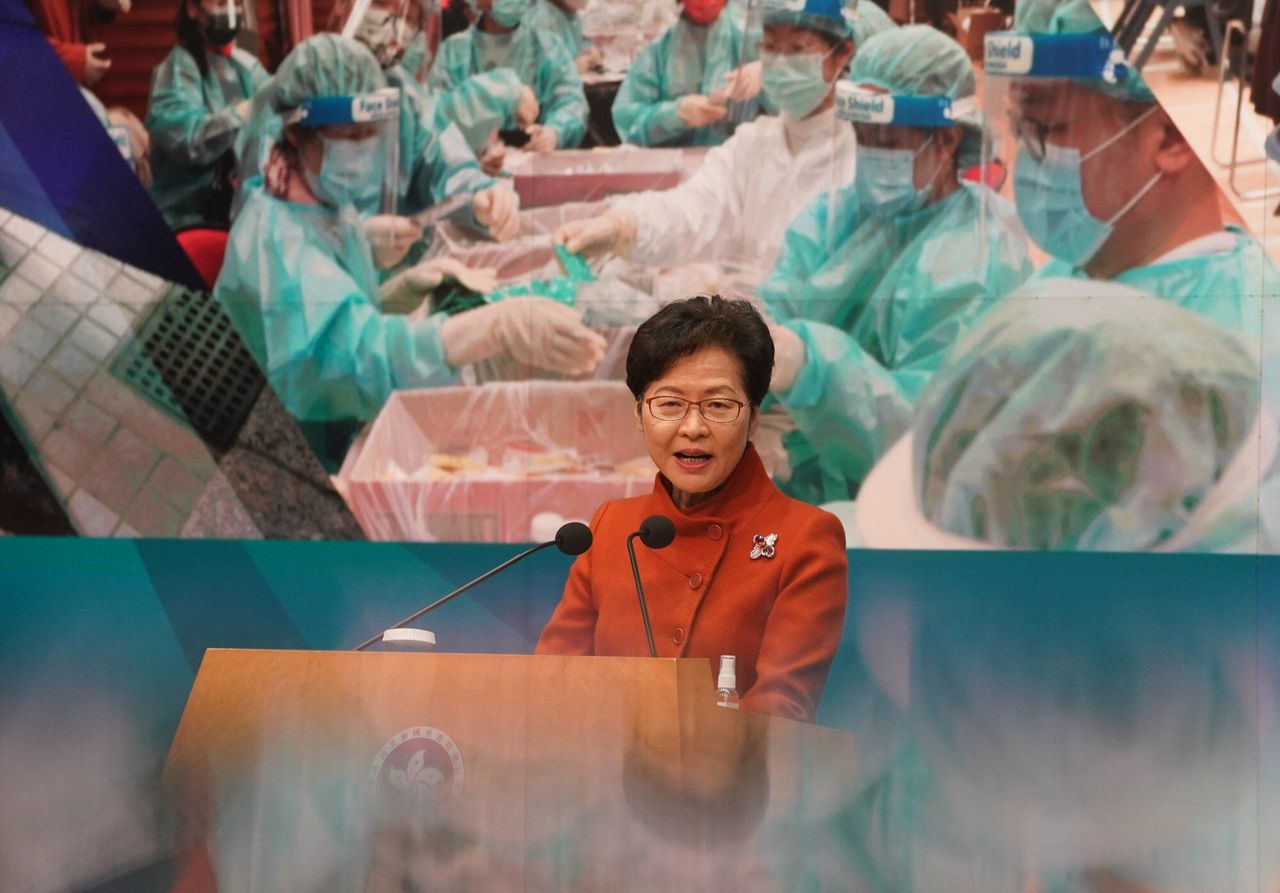Hong Kong News

Hong Kong considering universal testing to combat fifth wave: Carrie Lam
The government was considering universal Covid-19 screening to combat the explosive fifth wave, Hong Kong’s leader acknowledged on Thursday, marking a U-turn in the city’s stance a day after details of an internal discussion about the proposal were leaked to the public.
Sources described the measure as a last resort to cut off transmission chains in the event other steps such as tighter social-distancing measures failed to flatten the infection curve, although one medical expert warned the testing would be “pointless” without also locking down the city at the same time.
Another insider revealed that officials were weighing whether to send the collected specimens over the border for processing samples for the sake of efficiency, a move that could fuel privacy concerns.
Chief Executive Carrie Lam Cheng Yuet-ngor said details of the proposed universal testing were still being ironed out.
“We are considering conducting a citywide universal test when we have this capacity,” Lam said, after receiving a group of experts from mainland China at Shenzhen Bay border point.
“This will be a big operation, not something 100 testing vehicles can deliver. Hong Kong will have to collaborate by finding enough space, and the people will need to come out in an orderly manner to take the nucleic tests.”
Hong Kong’s fifth wave continued to worsen on Thursday, with 6,116 new infections reported and about 6,300 people testing preliminary-positive, both record highs.
According to sources close to one of the five task forces newly set up to better coordinate the response to the escalating health crisis, officials were considering testing residents three times within a short span.
Should the campaign go ahead, screening could begin in the middle of next month so long as construction of a large makeshift hospital went smoothly, one insider said.
Authorities would schedule the testing using residents’ identity cards, although not necessarily according to the numerical order of their unique number, the source added.
Children without an ID card would undergo testing with their parents.
Many operational details had not been decided, including whether to send specimens from Hong Kong to laboratories in Shenzhen for testing, according to the insider.
“The cost of sending thousands of sampling and testing personnel to Hong Kong is much higher, and efficiency is lower, than sending samples to labs in Shenzhen,” the source said.
A prerequisite for rolling out the large-scale screening was to make sure a mega makeshift hospital would be ready by then, he said. So far, three sites have been shortlisted.
The government has already secured 3,000 units in three public housing blocks and about 20,000 hotel rooms for isolating Covid-19 patients. Along with the roughly 7,100 beds in the health care system, Hong Kong would then have about 21,000 isolation units.
But the number might still be far from enough to meet the demand given the exponential growth of cases in the past week.
 Chief Executive Carrie Lam.
Chief Executive Carrie Lam.
Lam previously rejected the idea of universal testing, pointing to difficulties in implementing a citywide lockdown, and favoured instead mass testing according to individual buildings.
But she said on Thursday the universal screening campaign would be considered when the situation permitted. She had also requested the mainland to send personnel to help carry out swab tests of residents.
One of Lam’s advisers shrugged off concerns the U-turn in strategy might undermine the public’s confidence in the government.
“Which is more important? People’s lives or the government’s authority?” said Regina Ip Lau Suk-yee, a member of Lam’s Executive Council and a veteran lawmaker.
“A government has no credibility if it cannot save lives or solve problems. The situation has become highly critical, with a rapid spread of the virus, thousands of cases overstretching our hospital system and a spike in fatalities. It is high time to stop. We must bring all this to an end.”
Lau Siu-kai, vice-president of semi-official think tank the Chinese Association of Hong Kong and Macau Studies, said Hong Kong had gained greater political support for launching universal testing after Chinese President Xi Jinping weighed in on the pandemic response effort.
Pro-Beijing newspapers on Wednesday reported that Xi had instructed the local government to take all necessary measures to protect the lives and safety of the city’s residents and ensure overall social stability.
“The government could overcome its political obstacles after President Xi spoke up. There would be fewer people rejecting the idea of universal testing,” Lau said, adding that help from the mainland would ensure the city had sufficient resources to launch the campaign.
Infectious disease expert Dr Ho Pak-leung argued the key to effective mass testing was carrying it out quickly. Screening the population with rapid antigen tests every three days would be more efficient than using nucleic acid tests, which could take up to a week to process, he argued.
Ho noted that Spain had used rapid test kits for population screening in several regions about a year ago and succeeded in pushing down the transmission rate.
But Dr Joseph Tsang Kay-yan, co-chairman of the Medical Association’s advisory committee on communicable diseases, warned that universal testing would only be effective if employed along with a citywide lockdown.
“If the authorities are going to impose universal testing, they should seriously consider locking down the city. Otherwise, it will be pointless,” Tsang said.
The option of sending specimens to the mainland for testing had also raised privacy concerns, said Ramon Yuen Hoi-man, health spokesman for the Democratic Party.
Even if each bottle contained only a bar code, the resident’s identity could still be eventually traced, he maintained.
“Will this method be good enough to ease all privacy concerns?” Yuen said. “The government will need to give clearer explanations on this matter.”
The source acknowledged such concerns and agreed they would need to be addressed, with the testing procedure and confidentiality arrangements explained to the public.











